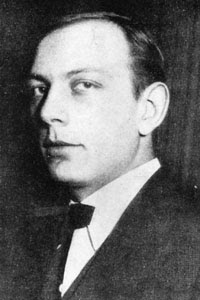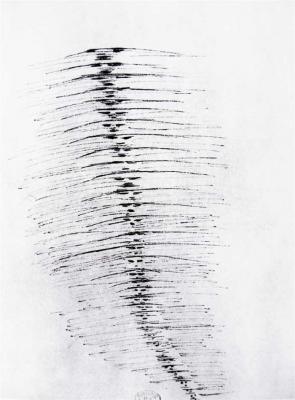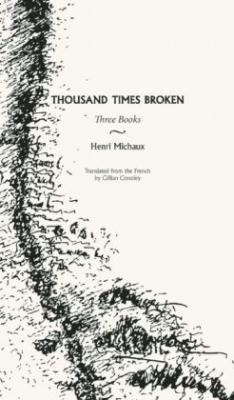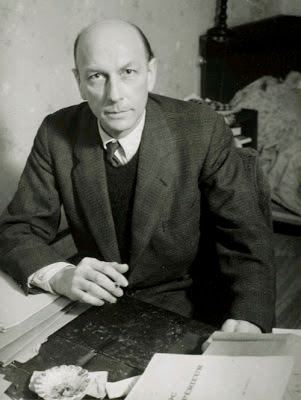“Is a statement really necessary?” So begins Henri Michaux’s introduction to a 1963 exhibition catalog of his drawings and gouaches. “Isn’t it obvious that I paint so as to leave words behind, to put an end to the irritating question of how and why? Could it really be that I draw because I see so clearly this thing or that thing? Not at all. Quite the contrary. I do it to be perplexed again.”* The same year, Michaux vowed that he would no longer write poetry — as he had pronounced before and would do again.
 In 1955, determined to evade his own habits as a poet, Michaux had all but abandoned the genre in favor of painting. The fifteen books he had published by this time “were relentlessly closing an iron collar on him” according to Alain Jouffroy, an art critic who visited him. This is why at the age of 57, Michaux began a decade-long experiment with mescaline and hashish, a daring move for someone who avoided liquor for most of his life. His experiences yielded several books of prose and poetry, three of which are now available in English for the first time in Thousand Times Broken, translated by the American poet Gillian Conoley.
In 1955, determined to evade his own habits as a poet, Michaux had all but abandoned the genre in favor of painting. The fifteen books he had published by this time “were relentlessly closing an iron collar on him” according to Alain Jouffroy, an art critic who visited him. This is why at the age of 57, Michaux began a decade-long experiment with mescaline and hashish, a daring move for someone who avoided liquor for most of his life. His experiences yielded several books of prose and poetry, three of which are now available in English for the first time in Thousand Times Broken, translated by the American poet Gillian Conoley.
In her introduction, she explains that the opening work, Peace in the Breaking (1957), begins with fourteen “spine-like, seismographic drawings that grow bigger and wider until they no longer form anything but a dust of signs.” Michaux’s ensuing prose describes the sensations of the moment of creation, but also has the equanimity to comment on itself:
 These drawings – must I say it? – are reconstructions. A hand two hundred times more agile than the human hand would not suffice for the task of following the accelerated course of the inexhaustible spectacle.
These drawings – must I say it? – are reconstructions. A hand two hundred times more agile than the human hand would not suffice for the task of following the accelerated course of the inexhaustible spectacle.
And it is out of the question to do more than follow. Here one cannot seize a thought, a term, or a figure, to work with it, to draws inspiration from it, or to improvise on it. All power over them is lost. Their speed, their independence, comes at that price.
Rather than a replacement art for the poverty of language, Michaux’s drawings present him with proof of a complementary, inspiring deficiency. Poetry’s power is reconfirmed at the conclusion: “The poem, a thousand times broken, presses and pushes to construct itself, to reconstruct, for one immense unforgettable day, in order to, through everything, reconstruct us.” Peace in the Breaking ends with the title poem — a work of ascent fated to move down the page, a wish to break away vying with the fixity of the material of its utterance: “an almost exquisite suffering / goes through my heart in my chest // linked to the loving cement that holds the fraternal world / undivided and near till its most distant point / and all enclosed in the sanctuary …”
 Michaux’s argument with language began in his disaffected youth. He recalled that his introduction to the dictionary was the most significant event of his post-adolescence. The critic Peter Broome described it as “the discovery of words in a state of disponibilité, uncommitted and not slaves to the ready-made.” Michaux developed an early aversion to absorbing anything that could not serve his private purposes, however inchoate. Hostile to his parents, he viewed adulthood as a provisional and absurd amalgam of selves. He would use language to protect himself from such demands, but this would necessitate its breakage and reassembly. In Façons d’endormi, façons d’eveillé, he writes, “My means of expression, that is to say my weapons, the tools of my power, give me an immediate capacity to disrupt reality.” But the power wanes. Substances help.
Michaux’s argument with language began in his disaffected youth. He recalled that his introduction to the dictionary was the most significant event of his post-adolescence. The critic Peter Broome described it as “the discovery of words in a state of disponibilité, uncommitted and not slaves to the ready-made.” Michaux developed an early aversion to absorbing anything that could not serve his private purposes, however inchoate. Hostile to his parents, he viewed adulthood as a provisional and absurd amalgam of selves. He would use language to protect himself from such demands, but this would necessitate its breakage and reassembly. In Façons d’endormi, façons d’eveillé, he writes, “My means of expression, that is to say my weapons, the tools of my power, give me an immediate capacity to disrupt reality.” But the power wanes. Substances help.
The second book, Watchtowers on Target (1959), begins with paintings by the Chilean surrealist Roberto Matta. The evaporating narrative begins with a crime, followed by the appearance of monsters and flying insects, surveilled by a watchman who in turn is watched. The middle section, “Correspondence,” comprises a series of “cards” – a set of directions, an orientation, a sermon? Then, three sinuous, incantatory poems end the second book.
CARD III
I speak as a man, not a bird in a cage. Leave the stinking marsh. I’m not jealous. I don’t know him, your Ottolutre. Who takes care of an insect, if he isn’t scratched by it? The crux of the situation is here. I will bring the dead branch back to life. Otherwise in the fire, and no weeping. I don’t want a soft welding. It always falls apart at the worst moment and you find yourself on the ground, pronto.
In the final book, Four Hundred Men on the Cross (1956), the boundary between pictorial and the poetic becomes leaky, each suffers to be the other, just as each of the several depictions of Jesus on the cross gives way to the others, each person fizzles out and reforms as the next victim. As Conoley writes, this work “grapples with his lost faith by trying to write and draw the crucified Christ, the model through which the self can only try to confirm, bound to failure.”
 The critic Malcolm Bowie has pointed out that “although Michaux spends a long time bewailing the poverty of language, he does not do only this: he puts language to work on all his visionary states no matter how lofty or defiantly non-verbal they seem.” Michaux describes the 252nd man on the cross as, “A thinker, a recluse, a contemplative man who does not notice that he is on the cross (or) who has rejected the temptation to believe that he has been put on the cross (or) who no longer wants to be distracted by anything to do with the cross, a man who ascends his steps.” This is a most brutal and compulsive self-analysis – but there are also indictments of those who inflict the pain: “impossible wood, the wood of joists that do not recognize the prophets and which, now that they hold one, will not let him go.” The visions of Four Hundred Men on the Cross are as impressive in their moral force as in their cerebral power.
The critic Malcolm Bowie has pointed out that “although Michaux spends a long time bewailing the poverty of language, he does not do only this: he puts language to work on all his visionary states no matter how lofty or defiantly non-verbal they seem.” Michaux describes the 252nd man on the cross as, “A thinker, a recluse, a contemplative man who does not notice that he is on the cross (or) who has rejected the temptation to believe that he has been put on the cross (or) who no longer wants to be distracted by anything to do with the cross, a man who ascends his steps.” This is a most brutal and compulsive self-analysis – but there are also indictments of those who inflict the pain: “impossible wood, the wood of joists that do not recognize the prophets and which, now that they hold one, will not let him go.” The visions of Four Hundred Men on the Cross are as impressive in their moral force as in their cerebral power.
Henri Michaux’s mescaline writings are celebrated for the freedoms they take, and rightly so. But the more one reads Michaux, the more he emerges as a poet who masters his essential difficulties, achieving not only ecstatic dissolutions but stabilities earned against the odds. His work comprises a protective strategy – a wavering sense of self-identity mitigates one’s fear of others. At the same time, he spends himself. His claim on us – and he is not so selfless as to not stake a claim – depends on our doing the same. Despite what we learned in Zoology 101, fight or flight are not the only alternatives. One can also take the drug and lie down before the beast.
[Published by City Lights Books on September 1, 2014. 136 pages, $16.95 paperback. You can acquire this book directly from City Lights by clicking here.]
* Included in John Ashbery’s Collected French Prose Translations, (Farrar, Straus & Giroux, 2013).